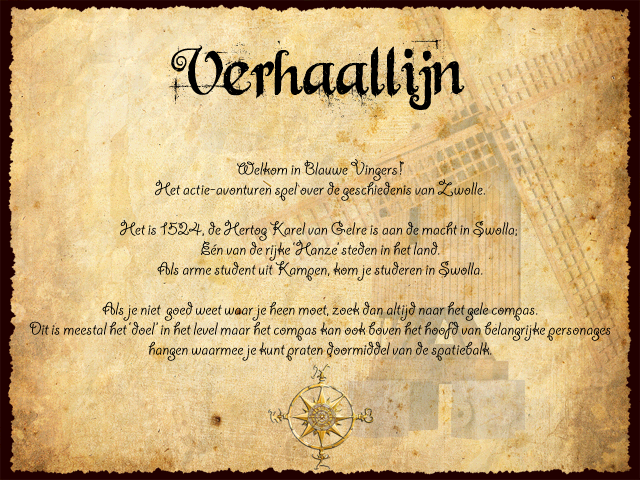
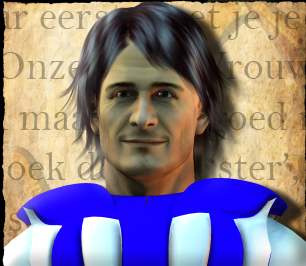
Welcome to Zwolle, the prosperous Hanseatic city! Our city wall ensures our safety and protects us from all outside dangers. My name is Issac, officer of the watch! To study in Zwolle, you will have to find a school and an inn. But first, you'll have to register with the 'Our Lady' church near here. Take a look around the city here, and look for the yellow 'compass' to move to the next district, where the church stands. Have a nice day!
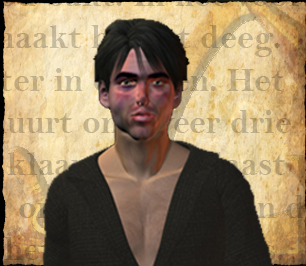
Hello, my name is Jacob. I'm reading a book about the professions of our time. It's fun to read about how many different jobs there are, isn't it? Let me read some to you.
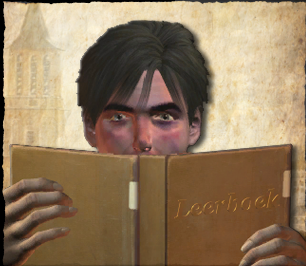
Fisherman The fisherman fishes the inland waters around our city. He catches fish with homemade nets or traps made from branches. Smoking the fish makes it better and last longer. The fisherman sells his catch at the town square, or just takes it home! Fish is not really a treat for the rich. Mostly poor people each fish! You can remember, then, that the fishermen himself is not so rich... he sells his fish mainly to poor people.
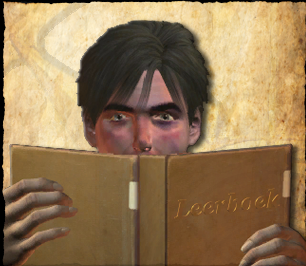
Beekeeper The beekeeper sleeps, cooks, and works in his house, like any other household does. The beehives are usually kept in the back garden. The beekeeper makes his own beehives, providing not only nests, but also housing for these critters. The beekeeper uses the honey that comes from the hives for himself, but sells most of it. The honey is used in all sorts of dishes as a sweetener. Thus, the food becomes sweet and tasty!

Basket weaver The basket weaver makes baskets in all shapes and sizes. If someone needs a basket, he comes to the basket weaver's house, and he makes a basket just the right size!

Woodworker The woodworker makes a lot of different parts. He makes wooden handles, spoons, rakes, and even weapons. But the woodworker can also make combs for the ladies, and whistles for the shepherds. Wood is used a lot everywhere. The woodworker always has a job somewhere. Larger parts, such as the wheels for a cart, or an entire fence, can be a task.

Blacksmith The blacksmith makes objects out of iron, such as nails, knives, and axes. The carpenter makes handles for weapons like axes, while the blacksmith makes the axehead itself. In his house, the blacksmith has a large fire so he can forge large pieces of iron. In the attic, he usually has a large storage space for coal. He uses the coal to keep the fire going. Meinder, our blacksmith here in Zwolle, is sometimes available in the town square.

Cabinet maker This man specializes in furniture. Some furniture is used for storing stuff, while some furniture is used for sitting. But only the cabinet maker can bring furniture to life. He also makes sofas, tables, chairs, and shelves for pots, pans, and other cookware. He therefore finds enough work!

Shoemaker The shoemaker uses leather from cows, goats, or calves for his shoes. All parts of the shoes are sewn by hand. Leather is very expensive. People who want to look rich are therefore keen to show off their leather shoes. The rich also have extra-long leather points to their footwear to stand out even more. Then everyone can see it. Not everyone has money for shoes. I myself prefer walking barefoot! I can put the money to better use for my studies haha...

The Barber-Surgeon This is an important person in the city. This man is not only a physician; he is also the hairdresser and beard shaver. He's also a dentist! The city gives the surgeon a home and a salary. Poor people are treated for free by this doctor. It's only fair! In the surgeon's house are various herbs and liquids he's found to make medicines. It is a very difficult profession, requiring much responsibility and knowledge!

The Baker Behind the baker's house is a large bakery oven in which he bakes the bread. He makes the dough in the front part of his house, and bakes his bread in the back. Baking a loaf of bread takes about three quarters of an hour. If the bread is ready, then the baker blows his horn to let the people in the city know that the bread is ready! Naturally, the people must pay money for it.
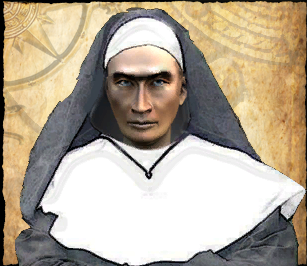
Good afternoon, my name is Helena. Welcome to the Wijtenhuys. I will tell you something about our religion and the Bible. The spread of biblical passages in the vernacular has increased dramatically in a short time. 30 years ago, all these books were still written by hand. However, since 1477, the printing press has provided for our requirements on a larger scale.

On January 10th, 1477 the Dutch Bible appeared from the hands of printers Jacob Jacobszoon van der Meer and Mauricius Yemantszoon van Middelborch as the first printed Dutch book. The content is based on the earlier Bible Historiale. The language has been modified, and the explanatory notes from the Historia Scolastica are omitted. Moreover, the minor prophets, Chronicles, Ezra, and Nehemiah were prepared by another, anonymous translator. The Dutch Bible has a circulation of about 250 copies!

Shortly thereafter, at the end of 1478, the nearly complete Dutch Bible appeared in Cologne. The Cologne Bible was printed by Heinrich Quentell, in cooperation with other printers. This Bible was published simultaneously in two editions in different dialects. One is edited in a dialect spoken in the eastern part of the Netherlands. The Song of Songs, however, is printed in Latin, because this poetic love song is not considered appropriate for young readers!

The Psalms were printed in the Cologne dialect. The text of the beautifully illustrated Cologne Bible is provided by the Carthusian Monks Monastery of St. Barbara in Cologne. They work to translate portions of the Bible by different translators, and may one day create a complete Bible. Have a nice day!